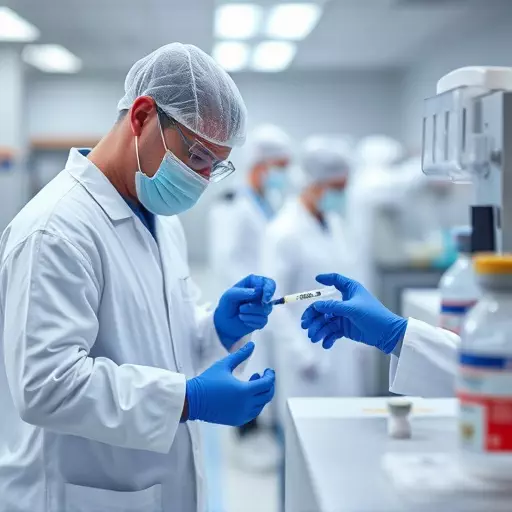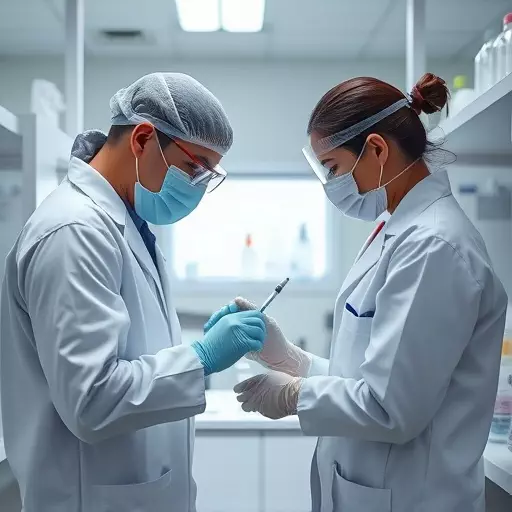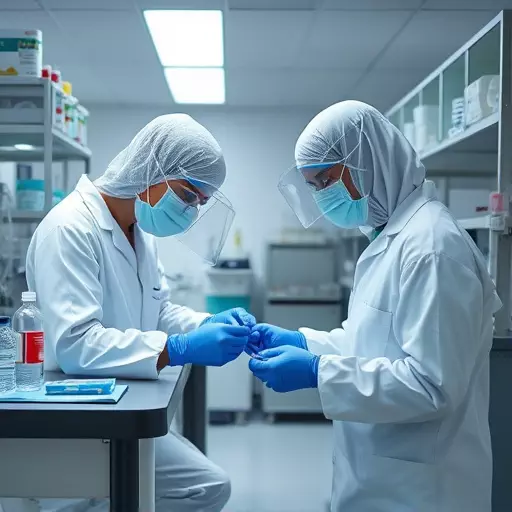Local laboratories in Detroit-Livonia-Dearborn are vital for tackling complex environmental health challenges. They drive research on antimicrobial resistance (AMR), providing data to inform policy and guide the implementation of effective vaccination campaigns. These labs play a dual role in combating AMR and supporting public health infrastructure, ensuring safer communities through evidence-based practices. Collaboration between labs, policymakers, and communities is key to improving health policies, with lab work enhancing understanding of AMR, developing new antimicrobials, and facilitating successful vaccine distribution. Their contributions are indispensable for addressing global health threats and creating sustainable solutions.
Labs play a pivotal role in tackling complex health-related environmental issues. From local initiatives like lab work in Detroit-Livonia-Dearborn to global challenges such as antimicrobial resistance, these institutions drive progress. This article explores the multifaceted contributions of labs, highlighting their essential roles in combating antimicrobial resistance, enhancing vaccination campaigns, adopting advanced technologies, fostering collaboration, and ultimately shaping effective health-related environmental policies.
- Lab Work in Detroit-Livonia-Dearborn: Unlocking Local Solutions for Environmental Health Challenges
- The Vital Role of Labs in Combating Antimicrobial Resistance: A Global Perspective
- Enhancing Public Health through Vaccination Campaigns: The Indispensable Contribution of Labs
- Advanced Technologies and Innovative Methods: How Labs Stay Ahead in Environmental Policy Development
- Collaboration and Communication: Building Bridges between Labs, Policymakers, and Communities
- Measuring Success: Evaluating the Impact of Lab Contributions on Shaping Effective Health-Related Environmental Policies
Lab Work in Detroit-Livonia-Dearborn: Unlocking Local Solutions for Environmental Health Challenges

In urban areas like Detroit-Livonia-Dearborn, lab work plays a pivotal role in tackling complex environmental health challenges. Local laboratories serve as hubs for innovative research and testing, particularly in the context of antimicrobial resistance (AMR). By studying local microbial ecosystems and tracking AMR trends, these labs contribute significantly to informed policy decisions aimed at curbing the rise of drug-resistant infections. This focused approach not only strengthens public health infrastructure but also ensures that strategies are tailored to the unique needs and environments of the community.
Moreover, labs in this region play a crucial part in implementing and monitoring public health vaccination campaigns. They provide essential services such as serological testing, vaccine-related quality control, and surveillance for adverse reactions. Through these activities, laboratories enable timely interventions, enhance vaccination coverage, and ultimately improve overall public health outcomes. This dual role in combating AMR and supporting vaccination efforts underscores the importance of labs in creating sustainable solutions that address immediate concerns while paving the way for a healthier future.
The Vital Role of Labs in Combating Antimicrobial Resistance: A Global Perspective

In the global fight against antimicrobial resistance (AMR), laboratories, especially those engaged in lab work in Detroit-Livonia-Dearborn and similar urban centers, play a pivotal role. The extensive research conducted within these facilities is instrumental in understanding the evolving nature of pathogens and developing effective countermeasures. By employing advanced techniques and technologies, labs identify novel antimicrobial agents, study resistance mechanisms, and monitor the impact of existing drugs, providing critical insights for policymakers. This data-driven approach enables the implementation of more targeted and efficient public health vaccination campaigns, helping to stem the rise of drug-resistant infections.
The role of labs extends beyond basic research; they are at the forefront of translating scientific discoveries into actionable policies. Through collaborative efforts with healthcare providers, regulatory bodies, and international organizations, laboratories ensure that new findings translate into practical applications. This includes guiding the development of guidelines for responsible antibiotic use, surveillance systems to track AMR trends, and educational programs aimed at raising awareness among healthcare professionals and the public. The importance of labs in controlling antimicrobial resistance cannot be overstated; their contributions are vital to shaping a sustainable future where effective antimicrobials remain available for all.
Enhancing Public Health through Vaccination Campaigns: The Indispensable Contribution of Labs

In the ongoing battle to safeguard public health, laboratories, especially those engaged in lab work in Detroit-Livonia-Dearborn, play an indispensable role. Their contributions extend far beyond conducting tests and analyses; they are at the forefront of implementing effective public health vaccination campaigns. These initiatives are crucial in combating infectious diseases and enhancing community well-being. Through meticulous research and testing, labs ensure the safety and efficacy of vaccines, which is vital in controlling antimicrobial resistance—a growing global concern.
The role of laboratories becomes even more significant when considering the complex landscape of public health. They provide data-driven insights that guide policy decisions, ensuring vaccination campaigns are targeted, efficient, and tailored to specific communities’ needs. This scientific approach not only saves lives but also fosters a culture of resilience against various health threats, making communities safer and healthier.
Advanced Technologies and Innovative Methods: How Labs Stay Ahead in Environmental Policy Development

In the realm of health-related environmental policies, labs play a pivotal role through advanced technologies and innovative methods. These facilities in Detroit-Livonia-Dearborn serve as crucibles for groundbreaking research, enabling scientists to stay ahead of emerging challenges. For instance, the study of antimicrobial resistance (AMR) has been significantly enhanced by lab work, where researchers employ cutting-edge techniques to understand and control this growing threat to public health. By leveraging advanced molecular techniques, labs identify novel antimicrobial compounds and develop strategies to combat drug-resistant pathogens.
Moreover, labs are instrumental in implementing successful public health vaccination campaigns. Through meticulous research and testing, they ensure the safety and efficacy of vaccines, contributing to widespread immunisation efforts. The role of labs extends beyond vaccine development; they also monitor environmental factors that impact human health, such as air and water quality, providing critical data for policy-making. This ensures that environmental policies are evidence-based and tailored to address specific regional challenges, ultimately leading to healthier communities.
Collaboration and Communication: Building Bridges between Labs, Policymakers, and Communities

Collaboration and communication are pivotal to improving health-related environmental policies, especially in areas like Detroit-Livonia-Dearborn where lab work plays a crucial role. Labs act as hubs for cutting-edge research, offering insights into complex issues such as antimicrobial resistance (AMR). Effective communication bridges between labs, policymakers, and communities ensure that research findings are translated into actionable policies. For instance, understanding the dynamics of AMR in local populations can inform targeted interventions, enhancing the effectiveness of public health strategies.
This collaborative ecosystem fosters the implementation of successful vaccination campaigns, a testament to the lab’s role in protecting community health. By engaging policymakers and communities in open dialogue, labs contribute to evidence-based decision-making processes. This approach not only ensures that policies are grounded in scientific rigor but also encourages buy-in from stakeholders, fostering a more sustainable and inclusive public health framework.
Measuring Success: Evaluating the Impact of Lab Contributions on Shaping Effective Health-Related Environmental Policies

Measuring the success of lab contributions to environmental policies is paramount in evaluating their impact on public health. In regions like Detroit-Livonia-Dearborn, laboratory work plays a pivotal role in tackling pressing issues such as antimicrobial resistance (AMR). By rigorously testing and monitoring bacterial strains, labs help identify emerging AMR patterns, guiding policy decisions to curb the proliferation of drug-resistant microorganisms. This is particularly crucial in shaping effective strategies for infection prevention and control in healthcare settings.
Furthermore, labs are instrumental in implementing public health vaccination campaigns. Through advanced diagnostic techniques, they ensure the safety and efficacy of vaccines, facilitating widespread distribution and administration. The role of laboratories in surveillance, research, and quality assurance is invaluable in addressing environmental health challenges. This includes not only AMR but also tracking the emergence of new diseases and evaluating the effectiveness of interventions, ensuring that public health policies are data-driven and responsive to evolving threats.
